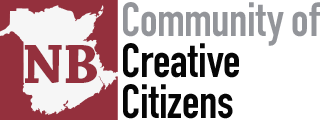New Brunswick’s green paper on education stated, “Schools alone cannot meet the needs of industry nor match the pace of growth and change. Simply adding and installing infrastructure in schools will not respond to this need.” This was a call to action for business, industry, and community leaders to partner with education in extending our expertise to NB’s youth.
New Brunswick’s largest companies, and corporations across the Maritime provinces, are among the leaders in their industries focused on driving exponential change through supporting and accessing breakthrough innovations. Whether it is McCain Food’s global initiative in creating “Farms of the Future”, the Irving Group of Companies’ progressive research and advanced analytics, the Ocean Super Cluster’s drive for innovations, or the University of New Brunswick’s Pond Deshpande Centre for social enterprise. Maritime industries are investing in developing and providing 21st Century advancements and resources that will match the pace of change in this era of transformation, and now they are extending these opportunities to students.
Industry is a robust resource and can bring access to authentic projects and challenges, building skills like critical thinking, problem solving, and collaboration while supporting the transfer of knowledge and skills acquired in the classroom to global contexts. Project based, and experiential learning opportunities are powerful and effective educational practices with unlimited potential for mentorships, industrial accreditations, badges and micro-credits, and sharing proprietary curriculum. Industry has shown the value in partnering to provide relevant experiences that connect students’ strengths and interests to meaningful challenges.
For example, as recently reported, 14 year old Anika Chebrolu, a grade 8 student at Nelson Middle School in Frisco, Texas was the 2020 winner of 3M’s Young Scientist Challenge and its $25,000 prize. “Anika used in-silico methodology for drug discovery to find a molecule that can selectively bind to the Spike protein of the SARS-CoV-2 virus in an attempt to find a cure for the COVID-19 pandemic.” Anika’s is a breakthrough achievement, but every student participating is enriched by the experience and engaged in learning.
3M has been exemplary in this outside-in approach of industry’s participation in education, taking seriously its role in the support of experiential learning to teach 21st Century competencies. 3M’s Young Scientist Challenge not only provides an annual XPRIZE-like incentive for student-led breakthroughs as well as numerous runner-up prizes, but also provides teacher, student, and parent resources to guide interest in science.
The use of advanced technologies will play an increasingly enabling role across early childhood to grade 12 education in the delivery of personalized and experiential learning opportunities. They will be indispensable tools in connecting to and involving community as we move into the future. As advancements in artificial intelligence (AI) becomes better developed and more widely integrated, tools assisting teachers in evaluating student progress and targeting instruction in support of personalized learning will bring increasing value. Augmented reality (AR) tools will connect students and teachers to experiences outside the classroom, such as vocational students to the shop floors of the most advanced manufacturers around the world. Industry is already adopting these tools in their employee training.
The education system is facing huge challenges. Fast-paced advancements in science, technology, manufacturing, and fabrication make it impossible for their shops and labs to stay current. Connecting with the industries who are investing the millions of dollars a year to keep up with the pace of change is an obvious solution. This will require building relationships with industry and businesses, , and using progressive approaches for demonstrating and documenting learning.Education-as-a-platform, refers to the new operating environments being adopted by organizations that allow them to absorb and utilize the ongoing and unrelenting pace of innovations and, in education’s case, apply them as appropriate in everything from pedagogy to technology. The use of technology will be akin to a utility. The integration of the use of technology and the ability to stay abreast, will be a major factor in meeting the citizen’s definition of efficacy in education.
Platforms open the opportunities for small companies to thrive alongside large corporation. James Wise of VC Balderton Capital observed that just as corporations are looking to work with smaller companies to accelerate innovation, adopt new technology and to become more agile, so are governments. Entrepreneurs are increasingly focused on solving issues around education, healthcare, and welfare. Social mission is more important than ever.
Platform approaches have emerged in response to the requirement of staying abreast and harnessing exponential change. Sangeet Paul Choudray, MIT Media Labs, is one of the foremost thought leaders in the value of platforms for government. Choudray refers to a ‘shaping strategy’ that points to a vision of what is being achieved through platform environments. While embracing the post-digital era we live in, the focus must clearly be on outcomes not the technology. “Creating that initial use case”, he says “is critical to the long-term success of the platform. In Chicago, the initial use case was the smart grid. In Singapore, it was transportation.”
In New Brunswick, Education as a Platform can be the compelling initial use case. Education’s world-wide technology ecosystem is well developed. It can be a catalyst for greater transformational change not only for education but across New Brunswick industry.
Daryl K. Branscombe
Coalition of Concerned Citizens (CCC)
